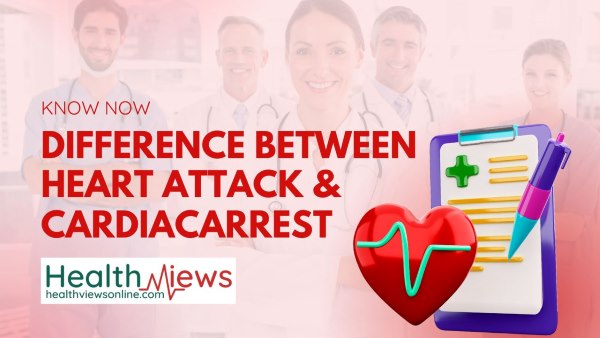When it comes to heart emergencies, people often use the terms “heart attack” and “cardiac arrest” interchangeably. But here’s the shocker—these are two entirely different medical emergencies! Knowing the difference could literally save a life, maybe even yours. Let’s break down, the difference between heart attack and cardiac arrest in the simplest way possible, with real-life doctor insights and facts that matter.
First, What Exactly is a Heart Attack?
Imagine a traffic jam inside your arteries. A heart attack happens when a blocked artery prevents oxygen-rich blood from reaching part of the heart. The heart keeps beating, but the longer the blockage remains, the more damage occurs.
Dr. Mehta, a leading cardiologist, explains:
“A heart attack is like a plumbing issue in your heart. The arteries are like pipes, and if they get clogged, blood flow gets disrupted, leading to muscle damage.”
Common Symptoms of a Heart Attack:
Chest pain or tightness (feels like an elephant sitting on your chest!)
Pain spreading to arms, neck, jaw, or back
Shortness of breath
Cold sweats and dizziness
Nausea and vomiting
What to Do?
If you or someone else experiences these symptoms, call emergency services (911 in the US, 112 in India, etc.) immediately. Chewing aspirin (if not allergic) can also help while waiting for help.
Also Read: Now Know All About the 5 Types of Heart Attacks in Young Adults
Now, What is Cardiac Arrest?
This is where things get truly terrifying. Unlike a heart attack, where the heart is struggling but still working, cardiac arrest means the heart stops beating completely. No blood flow = no oxygen to the brain = death within minutes if untreated.
Dr. Shah, an emergency specialist, says:
“Think of cardiac arrest like an electrical blackout. The heart’s rhythm suddenly malfunctions, causing it to stop beating. Without immediate action, survival chances drop drastically.”
Common Causes of Cardiac Arrest:
Heart attack (yes, a heart attack can trigger cardiac arrest!)
Severe electrolyte imbalances
Genetic heart conditions
Drug overdose or trauma
Extreme stress or shock
Symptoms of Cardiac Arrest:
Sudden collapse
No pulse, no breathing
Loss of consciousness
What to Do?
Unlike a heart attack, there’s no time to wait. Cardiac arrest is a life-or-death emergency. Immediate CPR and defibrillation (using an AED machine) can restart the heart.
➡️ Step 1: Call emergency services immediately.
➡️ Step 2: Start CPR (push hard and fast in the center of the chest).
➡️ Step 3: Use an Automated External Defibrillator (AED) if available.
Did you know? Over 90% of cardiac arrest victims die before reaching the hospital, but CPR can double or triple survival chances!
The Main Difference Between Heart Attack and Cardiac Arrest
| Feature | Heart Attack | Cardiac Arrest |
|---|---|---|
| Cause | Blocked artery | Electrical malfunction |
| Heart Function | Still beating | Stops completely |
| Main Symptom | Chest pain, shortness of breath | Collapse, no pulse |
| Response Needed | Call emergency, take aspirin, get medical help | Immediate CPR + AED |
Doctor’s Advice: How to Protect Yourself
Stay Active: Dr. Rao, a cardiologist, advises: “Exercise for at least 30 minutes a day. A simple walk can keep your heart happy!”
Eat Smart: Cut down on junk food, and eat more leafy greens, nuts, and heart-friendly fats.
Quit Smoking: Smoking narrows your arteries and doubles your risk of a heart attack.
Regular Check-ups: Get your cholesterol, blood pressure, and sugar levels checked.
Also Read: Increasing Incidents of Heart Attacks in Young Adults: Insights from Dr. Muhammed Musthafa M
FAQs About Heart Attack and Cardiac Arrest
❓ Can a young person have a heart attack?
✅ Yes! With stress, poor diet, and sedentary lifestyles, heart attacks in young adults are rising. Even people in their 20s can be at risk.
❓ Can a heart attack lead to cardiac arrest?
✅ Absolutely. A severe heart attack can trigger the heart’s electrical system to fail, causing cardiac arrest.
❓ What’s the best way to prevent a heart attack?
✅ Regular exercise, a heart-healthy diet, stress management, and routine check-ups are key.
❓ What’s the survival rate for cardiac arrest?
✅ If CPR is given immediately, survival chances improve drastically. Every second counts!

Final Thoughts: Heart Attack vs Cardiac Arrest
Now that you know the difference between a heart attack and cardiac arrest, you have the power to save lives. Understanding the warning signs, knowing how to respond, and keeping your heart healthy can make all the difference.
So, what will you do today to take care of your heart?
If you found this helpful, share it! You never know who might need this life-saving info.




